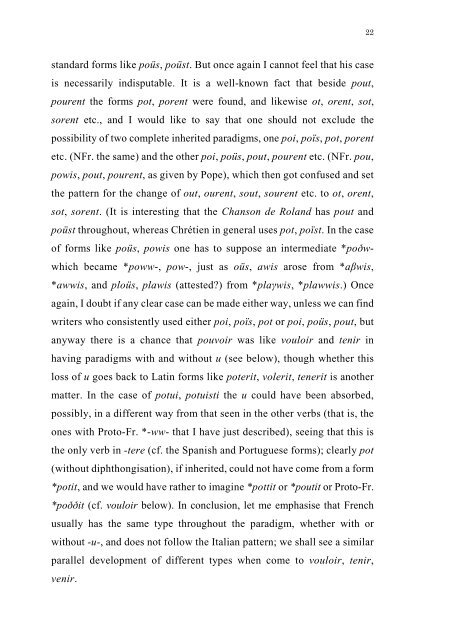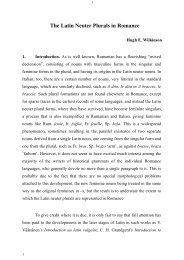THE STRONG PERFECTS IN THE ROMANCE ... - Page ON
THE STRONG PERFECTS IN THE ROMANCE ... - Page ON
THE STRONG PERFECTS IN THE ROMANCE ... - Page ON
Create successful ePaper yourself
Turn your PDF publications into a flip-book with our unique Google optimized e-Paper software.
standard forms like poüs, poüst. But once again I cannot feel that his case<br />
is necessarily indisputable. It is a well-known fact that beside pout,<br />
pourent the forms pot, porent were found, and likewise ot, orent, sot,<br />
sorent etc., and I would like to say that one should not exclude the<br />
possibility of two complete inherited paradigms, one poi, poïs, pot, porent<br />
etc. (NFr. the same) and the other poi, poüs, pout, pourent etc. (NFr. pou,<br />
powis, pout, pourent, as given by Pope), which then got confused and set<br />
the pattern for the change of out, ourent, sout, sourent etc. to ot, orent,<br />
sot, sorent. (It is interesting that the Chanson de Roland has pout and<br />
poüst throughout, whereas Chrétien in general uses pot, poïst. In the case<br />
of forms like poüs, powis one has to suppose an intermediate *poðw-<br />
which became *poww-, pow-, just as oüs, awis arose from *aβwis,<br />
*awwis, and ploüs, plawis (attested?) from *plaγwis, *plawwis.) Once<br />
again, I doubt if any clear case can be made either way, unless we can find<br />
writers who consistently used either poi, poïs, pot or poi, poüs, pout, but<br />
anyway there is a chance that pouvoir was like vouloir and tenir in<br />
having paradigms with and without u (see below), though whether this<br />
loss of u goes back to Latin forms like poterit, volerit, tenerit is another<br />
matter. In the case of potui, potuisti the u could have been absorbed,<br />
possibly, in a different way from that seen in the other verbs (that is, the<br />
ones with Proto-Fr. *-ww- that I have just described), seeing that this is<br />
the only verb in -tere (cf. the Spanish and Portuguese forms); clearly pot<br />
(without diphthongisation), if inherited, could not have come from a form<br />
*potit, and we would have rather to imagine *pottit or *poutit or Proto-Fr.<br />
*poððit (cf. vouloir below). In conclusion, let me emphasise that French<br />
usually has the same type throughout the paradigm, whether with or<br />
without -u-, and does not follow the Italian pattern; we shall see a similar<br />
parallel development of different types when come to vouloir, tenir,<br />
venir.<br />
22









